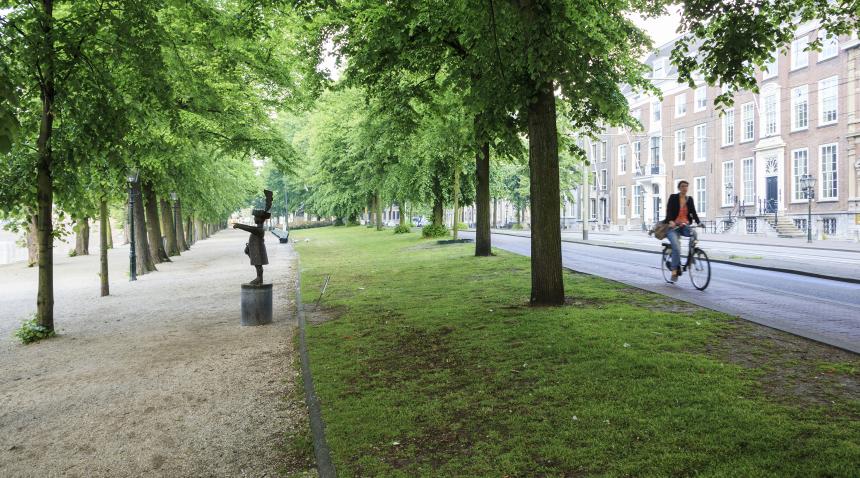
Cycling in the Netherlands
Bicycles are one of the most popular modes of transport in the Netherlands. You’ll notice that everywhere you go, there are bikes lining the streets. In fact, there are more bicycles in the Netherlands than there are people. The flat terrain and dedicated cycling lanes make biking one of the most efficient ways to travel.
Cycling from one end of The Hague to the other takes about 45 minutes for an average cyclist. If you plan to commute by bicycle and your stay in The Hague is longer than nine months, we recommend purchasing a bike. For shorter-term stays, you could make use of online sharing platforms and organisations such as Swapfiets. Both traditional and electric bikes are available for renting and on sharing platforms. Online maps and route planners for cyclists are available.
If you’ve recently arrived in the Netherlands, don’t be intimidated by the prospect of hopping on a bike. This guide will tell you everything you need to know to start cycling.
Choose Your Bicycle
The first thing to do is to procure a bicycle. There are two ways to do this: buy or rent. If you’re looking to buy, new bikes are available from about €250, while used bikes are generally between the €50 to €150 range. Electric bikes, which are rapidly gaining in popularity, are available in various types and specifications. There are many bike shops throughout the city; or consider checking out the second-hand platform Marktplaats for a variety of used bikes. Be aware that new, expensive-looking bikes are often targeted for theft!
Prefer to rent? There are several options available. Sign up for a bike-sharing scheme or consider signing up for Swapfiets, a service that covers maintenance of your bike for a monthly fee. If you commute to another city, renting an OV-fiets could be a good option. They are available at most major train stations.
Quick Tips for Dutch Cycling
Follow these tips to stay safe and travel efficiently.
- Follow the general rules of the road – adhere to traffic lights and signs.
- If there is no cycle lane, use the road and not the pavement.
- Use hand signals when turning.
- Always pass on the left.
- Make sure your bike is equipped with a bell and front and back lights.
- Pay attention to tram rails as bike wheels can get stuck in them.
- Helmets are not mandatory.
- Follow this guide (available in Dutch, English, and French) for a more in-depth look at road safety.
Learning to Cycle
If you’re just starting out or you think you need a refresher, there are group and individual lessons available. The following websites (in Dutch) will connect you to cycling schools and instructors.
- Learn how to bike at Het Fietscollege
- Find a cycling instructor near you
- Find a cycling school for beginners
Children and Cycling
In the Netherlands, children are taught how to cycle from an early age. All Dutch primary schools organise traffic safety classes (veilig verkeer) for their young students. Around the age of 11 or 12, students sit their biking exams to ensure they know how to safely navigate the roads on a bicycle.
Very young children can ride with you on your bike in either a children’s seat or a bakfiets (a cargo bike with a large box in front, equipped with seats).
Parking Your Bicycle
Though it seems like there is no order to all the bikes parked everywhere, there is some sense in all the chaos. If you’re parking outside, make sure there is no Geen fietsen plaatsen (‘No bike parking’) sign. Use a bike stand if possible. Find information about where to park your bike in The Hague.
For security, double-lock your bike (including wheels and frame) and keep a spare set of keys at home. There are also free and supervised bicycle parking facilities in The Hague and Delft if you’d rather not park on the street. Look up Biesieklette to find secure bicycle parking facilities in The Hague region.
Missing Your Bicycle?
Sometimes, if you don’t park your bike in the correct spot, the municipality will remove it. If you live in The Hague and Delft, you can pick up your bike at the Bicycle Depot Haaglanden. People living in The Hague can also check out the Kranestraat. You’ll have to pay (bank cards only) to get your bike back.
Bicycle Repair
You’ll never struggle to find a place to get your bike repaired. With the sheer number of bicycles in the country, there will always be a local bike shop for all your maintenance needs.
Bicycles and Public Transport
Though you cannot take your bike on the bus, you can take it on the tram, train or metro. Check the NS website for rules on taking your bike on the train or check out 9292 for the rules for other public transport operators.
Mopeds and Scooters
Mopeds are very common in The Hague and are often considered efficient alternatives to cars for regional and urban travel. Electric mopeds are gaining popularity. All mopeds with a maximum speed of 45kmh must be driven on the road, not on bicycle paths or dedicated bike lanes. There are also sharing services for e-mopeds, including Felyx, Go Sharing and Check. Note that mopeds are usually referred to as ‘scooters’ in the Netherlands.
Electric scooters, with a platform for standing on, are not commonly used in the Netherlands.
Looking for an alternative to cycling? With its excellent public transport system, getting around The Hague is straight-forward and convenient. Or you could book a taxi.







